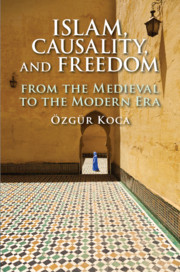Book contents
- Islam, Causality, and Freedom
- Islam, Causality, and Freedom
- Copyright page
- Dedication
- Contents
- Conventions
- Acknowledgments
- Introduction
- 1 Causality in the Early Period
- 2 Toward a Synthesis of Aristotelian and Neoplatonic Understandings of Causality
- 3 Occasionalism in the Middle Period
- 4 The First as Pure Act and Causality
- 5 Light, Existence, and Causality
- 6 The World as a Theophany and Causality
- 7 Continuities and Developments in Sufi Metaphysics
- 8 Toward an Occasionalist Philosophy of Science
- 9 Causality and Freedom in Later Islamic Philosophy
- 10 Occasionalism in the Modern Context
- 11 Islamic Theories of Causality in the Modern Context
- Conclusion
- Bibliography
- Index
1 - Causality in the Early Period
Muʿtazilites and the Birth of Ashʿarite Occasionalism
Published online by Cambridge University Press: 14 May 2020
- Islam, Causality, and Freedom
- Islam, Causality, and Freedom
- Copyright page
- Dedication
- Contents
- Conventions
- Acknowledgments
- Introduction
- 1 Causality in the Early Period
- 2 Toward a Synthesis of Aristotelian and Neoplatonic Understandings of Causality
- 3 Occasionalism in the Middle Period
- 4 The First as Pure Act and Causality
- 5 Light, Existence, and Causality
- 6 The World as a Theophany and Causality
- 7 Continuities and Developments in Sufi Metaphysics
- 8 Toward an Occasionalist Philosophy of Science
- 9 Causality and Freedom in Later Islamic Philosophy
- 10 Occasionalism in the Modern Context
- 11 Islamic Theories of Causality in the Modern Context
- Conclusion
- Bibliography
- Index
Summary
The first chapter focuses on early Muʿtazilite and Ashʿarite theologians. It examines the birth and development of Ashʿarite occasionalism as a response to the Muʿtazilite theological project which aims to preserve the intelligibility of the world and God and, to this end, is ready to accept the idea of necessity in the world and, even, in God. The modus operandi of Ashʿarite theological project in this context remains to preserve the divine will and freedom. This, then, leads to construction of, what I call, a theology of possibility. It is within the larger context of this debate that occasionalist theory of causality emerges as the cornerstone of Ashʿarite theology of possibility. The chapter starts with an examination of early Ashʿarite and Muʿtazilite discussions about the relationship of the divine attributes to God. It then shows how these discussions led to the emergence of Ashʿarite occasionalism. Finally, it explores how the occasionalist perspective provided the basis for Ashʿarite convictions on other important cosmological and theological discussions.
- Type
- Chapter
- Information
- Islam, Causality, and FreedomFrom the Medieval to the Modern Era, pp. 16 - 39Publisher: Cambridge University PressPrint publication year: 2020

